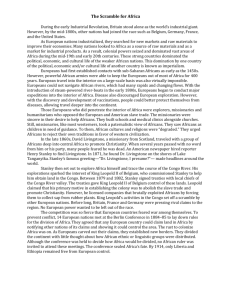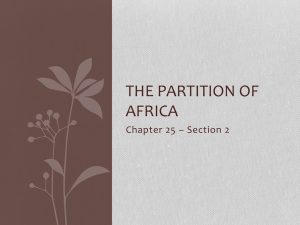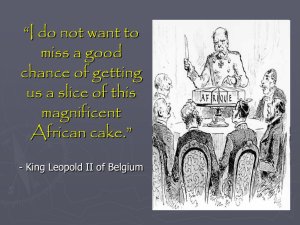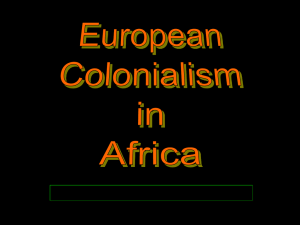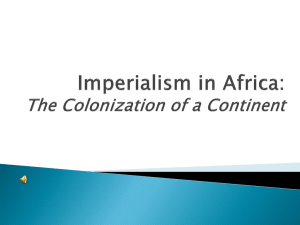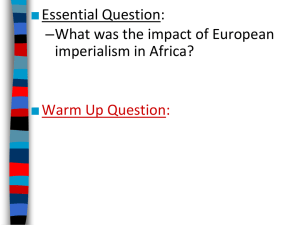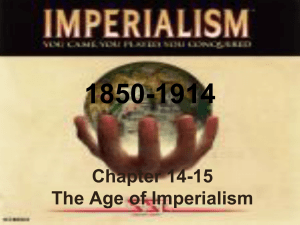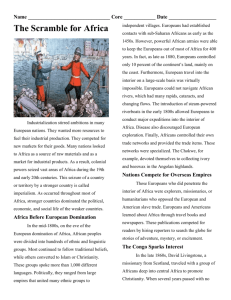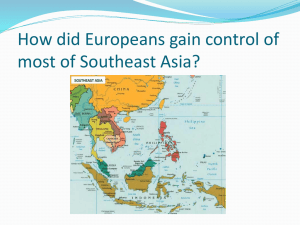The Division of Africa
advertisement
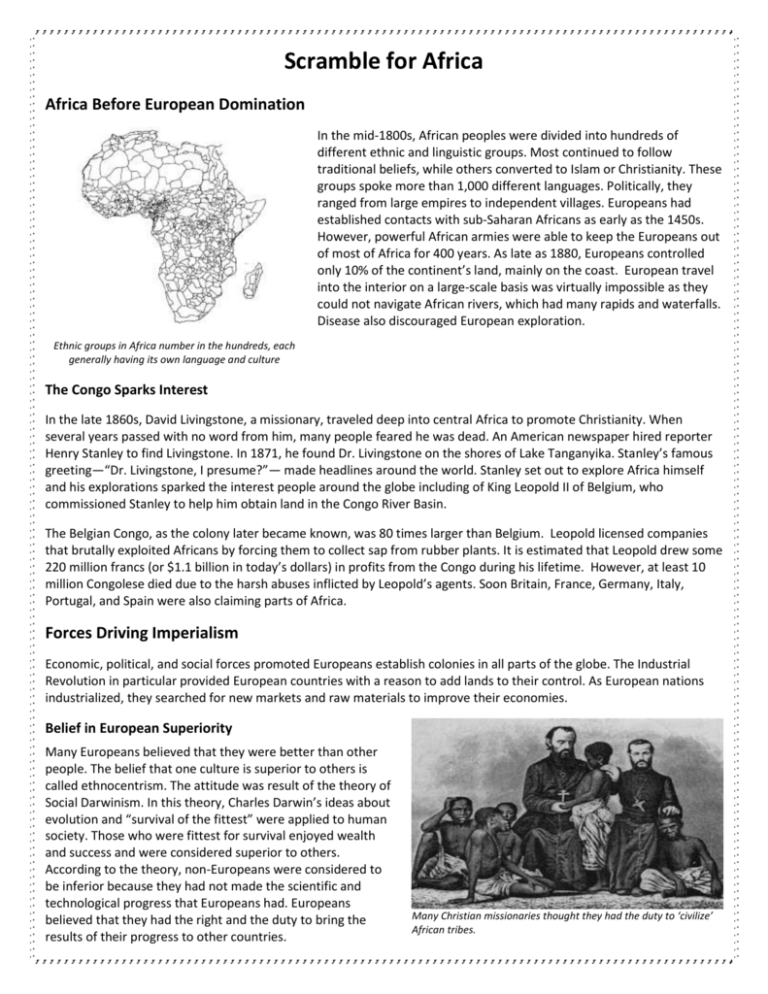
Scramble for Africa Africa Before European Domination In the mid-1800s, African peoples were divided into hundreds of different ethnic and linguistic groups. Most continued to follow traditional beliefs, while others converted to Islam or Christianity. These groups spoke more than 1,000 different languages. Politically, they ranged from large empires to independent villages. Europeans had established contacts with sub-Saharan Africans as early as the 1450s. However, powerful African armies were able to keep the Europeans out of most of Africa for 400 years. As late as 1880, Europeans controlled only 10% of the continent’s land, mainly on the coast. European travel into the interior on a large-scale basis was virtually impossible as they could not navigate African rivers, which had many rapids and waterfalls. Disease also discouraged European exploration. Ethnic groups in Africa number in the hundreds, each generally having its own language and culture The Congo Sparks Interest In the late 1860s, David Livingstone, a missionary, traveled deep into central Africa to promote Christianity. When several years passed with no word from him, many people feared he was dead. An American newspaper hired reporter Henry Stanley to find Livingstone. In 1871, he found Dr. Livingstone on the shores of Lake Tanganyika. Stanley’s famous greeting—“Dr. Livingstone, I presume?”— made headlines around the world. Stanley set out to explore Africa himself and his explorations sparked the interest people around the globe including of King Leopold II of Belgium, who commissioned Stanley to help him obtain land in the Congo River Basin. The Belgian Congo, as the colony later became known, was 80 times larger than Belgium. Leopold licensed companies that brutally exploited Africans by forcing them to collect sap from rubber plants. It is estimated that Leopold drew some 220 million francs (or $1.1 billion in today’s dollars) in profits from the Congo during his lifetime. However, at least 10 million Congolese died due to the harsh abuses inflicted by Leopold’s agents. Soon Britain, France, Germany, Italy, Portugal, and Spain were also claiming parts of Africa. Forces Driving Imperialism Economic, political, and social forces promoted Europeans establish colonies in all parts of the globe. The Industrial Revolution in particular provided European countries with a reason to add lands to their control. As European nations industrialized, they searched for new markets and raw materials to improve their economies. Belief in European Superiority Many Europeans believed that they were better than other people. The belief that one culture is superior to others is called ethnocentrism. The attitude was result of the theory of Social Darwinism. In this theory, Charles Darwin’s ideas about evolution and “survival of the fittest” were applied to human society. Those who were fittest for survival enjoyed wealth and success and were considered superior to others. According to the theory, non-Europeans were considered to be inferior because they had not made the scientific and technological progress that Europeans had. Europeans believed that they had the right and the duty to bring the results of their progress to other countries. Many Christian missionaries thought they had the duty to ‘civilize’ African tribes. Cecil Rhodes, a successful businessman and a major supporter of British expansion, clearly stated this position: “I contend that we [Britons] are the first race in the world, and the more of the world we inhabit, the better it is for the human race. . . . It is our duty to seize every opportunity of acquiring more territory…” The push for expansion also came from missionaries who worked to convert the peoples of Asia, Africa, and the Pacific Islands to Christianity. They also wanted to “civilize,” that is, to “Westernize,” the peoples of the foreign land. Rhodes’s De Beers Consolidated Mines is the biggest diamond company in the world today. Factors Promoting Imperialism in Africa Several factors contributed to the Europeans’ conquest of Africa. One huge advantage was the Europeans’ technological superiority. The Maxim gun was the world’s first automatic machine gun. European countries quickly employed the Maxim, while the resisting Africans were forced to rely on outdated weapons. The invention of the steam engine allowed Europeans to easily travel on rivers to establish bases deep in the continent. Railroads, cables, and steamships allowed close communications within a colony The disease malaria, carried by mosquitos, kept Europeans out of the and between the colony and its controlling nation. Even interior of Africa. However the invention of quinine made European with superior arms and steam engines to transport them, expansion possible. another factor might have kept Europeans confined to the coast. They were highly susceptible to malaria, a disease carried by the dense swarms of mosquitoes in Africa’s interior. The perfection of the drug quinine in 1829 eventually protected Europeans from becoming infected with this disease. Factors within Africa also made the continent easier for Europeans to colonize. Africans’ huge variety of languages and cultures discouraged unity among them. Wars fought between ethnic groups over land, water, and trade rights also prevented a unified stand. Europeans soon learned to play rival groups against each other. The Division of Africa The scramble for African territory had begun in earnest about 1880. The discoveries of diamonds in 1867 and gold in 1886 in South Africa increased European interest in colonizing the continent. No European power wanted to be left out. Berlin Conference Divides Africa The competition was so fierce that European countries feared war among themselves. To prevent conflict, 14 European nations met at the Berlin Conference to lay down rules for the division of Africa. They agreed that any European country could claim land in Africa by notifying other nations of its claims and showing it could control the area. The European nations divided the continent with little thought about how African ethnic groups would be affected. No African ruler was invited to attend these meetings, yet the conference sealed Africa’s fate. Demand for Raw Materials Shapes Colonies While African colonies never became a major market for European industrial goods, European businesses still needed raw materials from Africa. The major source of great wealth in Africa proved to be the continent’s rich mineral resources. The Belgian Congo contained untold wealth in copper and tin. But even these riches seemed small compared with the gold and diamonds in South Africa. Businesses eventually developed cash-crop plantations to grow peanuts, palm oil, cocoa, and rubber. These products displaced the food crops grown by farmers to feed their families. Name__________________________________________________Period__________________Date________________ 1. Which of the following BEST describes Africa before European colonization? a. A continent with little ethnic and linguistic diversity b. A continent made up of primarily Christian populations c. A continent with political organizations ranging from small villages to powerful empires d. A continent undergoing rapid industrialization 2. What invention allowed for European colonization of Africa? a. Quinine b. Maxim Machine Gun c. Steam engines d. All of the Above 3. Which of the following is TRUE regarding the Berlin Conference and its decisions? a. The Conference was in response to wars over colonies that had already broken out b. Colonizing nations had to construct internal improvements such as hospitals and schools c. The Conference was in response for European demand for African natural resources d. Local African leaders had significant input regarding the decisions made 4. Which of the following quotes would Cecil Rhodes MOST LIKELY agree? a. Remember that you are an Englishman, and have consequently won first prize in the lottery of life. b. We must find new lands from which we can easily obtain raw materials c. What a country needs to do is be fair to all its citizens – regardless of ethnicity d. All of the Above 5. Define the concept of ‘Social Darwinism’ and how it influenced the European scramble for Africa. ___________________________________________________________________________________________ ___________________________________________________________________________________________ ___________________________________________________________________________________________ ___________________________________________________________________________________________ 6. In your opinion, what was the most important factor that allowed for European colonization? Why? ___________________________________________________________________________________________ ___________________________________________________________________________________________ ___________________________________________________________________________________________ 7. The cartoon is MOST LIKELY about which of the following individuals. Explain why you think so. a. Dr. David Livingstone b. Henry Stanley c. King Leopold II I chose the above option because _______________________ ___________________________________________________ ___________________________________________________ ___________________________________________________ ___________________________________________________ ___________________________________________________ Directions: Use the list to the right to create a color coded map of how Africa was divided up by colonization.
